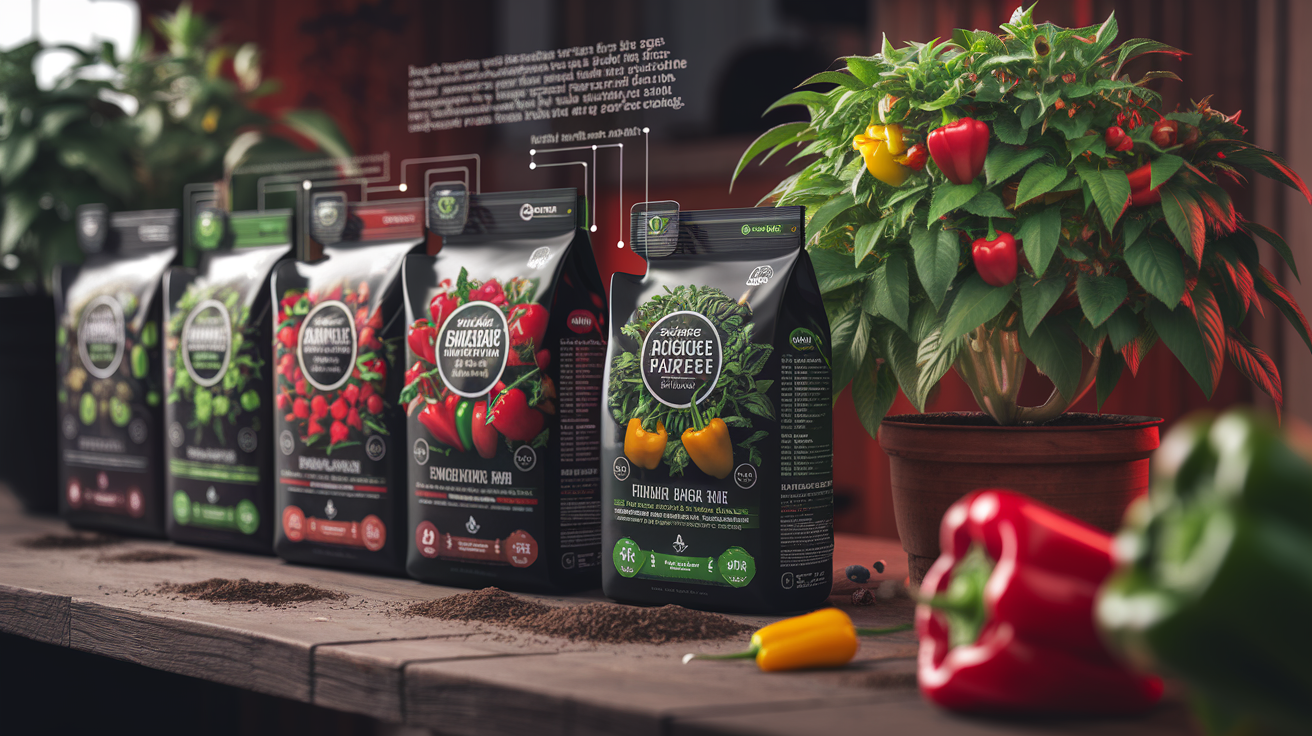Choosing the right fertilizer for your pepper plants is crucial for achieving a bountiful harvest. With so many options available, finding the best fertilizer can be overwhelming. Rhys Garden will guide you through the key nutrients your pepper plants need and recommend the top fertilizers to help your peppers thrive. Whether you’re a seasoned gardener or just starting, understanding how to properly nourish your pepper plants will set you on the path to growing healthy, productive crops.
Understanding Pepper Plant Nutritional Needs
Before we explore the best fertilizers for pepper plants, it’s crucial to understand their nutritional requirements. Pepper plants are heavy feeders, meaning they require a good balance of nutrients throughout their growing season to produce healthy foliage and abundant fruit.
Pepper plants need three primary macronutrients:
- Nitrogen (N): Essential for leaf growth and overall plant health
- Phosphorus (P): Crucial for root development and flower production
- Potassium (K): Important for fruit development and disease resistance
In addition to these macronutrients, pepper plants also benefit from secondary nutrients and micronutrients, including:
- Calcium: Helps prevent blossom end rot
- Magnesium: Supports chlorophyll production
- Iron: Essential for photosynthesis
- Zinc: Aids in enzyme production and growth regulation
Types of Fertilizers for Pepper Plants
When it comes to fertilizing pepper plants, gardeners have several options. Let’s explore the different types of fertilizers available and their pros and cons.
Organic Fertilizers
Organic fertilizers are derived from natural sources and offer several benefits for pepper plants:
Pros of Organic Fertilizers:
- Improve soil structure and health
- Release nutrients slowly over time
- Promote beneficial microbial activity in the soil
- Environmentally friendly
Cons of Organic Fertilizers:
- Slower to show results compared to synthetic fertilizers
- May have inconsistent nutrient ratios
- Can be more expensive
Popular Organic Fertilizers for Pepper Plants:
- Compost
- Well-rotted manure
- Fish emulsion
- Bone meal
- Blood meal
Synthetic Fertilizers
Synthetic fertilizers are manufactured chemical products designed to provide specific nutrient ratios:
Pros of Synthetic Fertilizers:
- Fast-acting and readily available to plants
- Precise nutrient ratios
- Often more affordable
Cons of Synthetic Fertilizers:
- Can lead to nutrient runoff if overused
- May not improve soil structure
- Potential to burn plants if overapplied
Popular Synthetic Fertilizers for Pepper Plants:
- 5-10-10 granular fertilizer
- 10-10-10 all-purpose fertilizer
- Water-soluble fertilizers with micronutrients
The Best Fertilizer for Pepper Plants: Our Recommendations

After extensive research and consultation with horticulture experts, we at Rhys Garden have compiled a list of the best fertilizers for pepper plants. Our recommendations are based on nutrient content, ease of use, and overall plant health benefits.
Top Organic Fertilizer Choice: Espoma Garden-tone
Espoma Garden-tone is an excellent organic fertilizer for pepper plants. It has a balanced NPK ratio of 3-4-4 and includes beneficial soil microbes.
Why We Recommend It:
- Slow-release formula provides nutrients throughout the growing season
- Contains a blend of natural ingredients, including poultry manure and feather meal
- Enriched with Bio-tone microbes to enhance nutrient absorption
Top Synthetic Fertilizer Choice: Miracle-Gro Performance Organics Edibles
While technically a hybrid of organic and synthetic components, this fertilizer offers the best of both worlds for pepper plants.
Why We Recommend It:
- NPK ratio of 7-6-9, ideal for fruit-bearing plants like peppers
- Contains natural and synthetic ingredients for quick and sustained feeding
- OMRI listed for organic gardening
Best Liquid Fertilizer: Neptune’s Harvest Fish & Seaweed Fertilizer
For those who prefer liquid fertilizers, Neptune’s Harvest Fish & Seaweed Fertilizer is an excellent choice for pepper plants.
Why We Recommend It:
- Rich in micronutrients and growth hormones
- Promotes strong root development and increased fruit yield
- Can be applied as a foliar spray or soil drench
How to Apply Fertilizer to Pepper Plants
Proper application of fertilizer is just as important as choosing the right product. Here’s a guide to fertilizing your pepper plants effectively:
Timing is Key
- Start fertilizing when pepper plants have established themselves, usually about 2-3 weeks after transplanting
- Continue fertilizing every 4-6 weeks throughout the growing season
Follow the Instructions
- Always read and follow the manufacturer’s instructions for application rates
- Over-fertilizing can harm your plants, so it’s better to err on the side of caution
Method of Application
- For granular fertilizers, sprinkle around the base of the plant, avoiding direct contact with stems
- For liquid fertilizers, dilute according to instructions and apply to the soil or as a foliar spray
Water After Application
- Water your pepper plants thoroughly after applying fertilizer to help distribute nutrients and prevent root burn
Common Mistakes to Avoid When Fertilizing Pepper Plants
Even experienced gardeners can make mistakes when it comes to fertilizing pepper plants. Here are some common pitfalls to avoid:
- Over-fertilizing: This can lead to excessive foliage growth at the expense of fruit production
- Using high-nitrogen fertilizers late in the season: This can delay fruit ripening
- Neglecting soil pH: Pepper plants prefer slightly acidic soil with a pH between 6.0 and 6.8
- Ignoring organic matter: Relying solely on synthetic fertilizers without adding compost or other organic matter to the soil
- Inconsistent feeding: Sporadic fertilization can stress plants and lead to poor yields
Organic Alternatives to Commercial Fertilizers
For gardeners who prefer a more natural approach, there are several organic alternatives to commercial fertilizers that can benefit pepper plants:
Compost Tea
Compost tea is a nutrient-rich liquid made by steeping compost in water. It’s an excellent way to provide a quick nutrient boost to pepper plants.
How to Make Compost Tea:
- Fill a bucket 1/3 full with finished compost
- Add water to fill the bucket
- Stir daily for 3-5 days
- Strain the liquid and dilute it 1:10 with water before applying to plants
Green Manure
Green manure involves growing cover crops like clover or vetch, then turning them into the soil before they set seed. This adds organic matter and nutrients to the soil.
Worm Castings
Worm castings are a nutrient-dense organic fertilizer produced by earthworms. They’re rich in beneficial microorganisms and provide a slow-release source of nutrients for pepper plants.
The Role of Soil Testing in Fertilizer Selection
Choosing the best fertilizer for your pepper plants becomes much easier when you know your soil’s composition. Soil testing can provide valuable information about:
- Current nutrient levels
- Soil pH
- Organic matter content
Many agricultural extension offices offer soil testing services for a nominal fee. Based on the results, you can tailor your fertilizer choice and application to address any deficiencies in your soil.
Fertilizing Pepper Plants in Different Growing Conditions
The best fertilizer for pepper plants can vary depending on your growing conditions. Let’s explore some specific scenarios:
Container Gardening
When growing peppers in containers:
- Choose a potting mix specifically formulated for vegetables
- Use a slow-release fertilizer at planting time
- Supplement with liquid fertilizer every 2-3 weeks, as nutrients leach out more quickly in containers
Hydroponic Systems
For hydroponic pepper growing:
- Use a balanced hydroponic nutrient solution
- Maintain proper EC (electrical conductivity) levels
- Adjust nutrient ratios as plants move from vegetative to fruiting stages
Greenhouse Growing
In greenhouse conditions:
- Monitor soil moisture carefully, as over-watering can lead to nutrient leaching
- Consider using CO2 enrichment in conjunction with proper fertilization for optimal growth
- Pay extra attention to calcium levels to prevent blossom end rot
The Impact of Climate on Pepper Plant Fertilization
Climate plays a significant role in how pepper plants utilize nutrients. In different climates, you may need to adjust your fertilization strategy:
Hot, Humid Climates
- Focus on potassium to improve heat tolerance
- Apply fertilizer more frequently in small doses due to increased growth rates
- Monitor for nutrient leaching due to heavy rains
Cool, Temperate Climates
- Use season extenders like row covers or greenhouses
- Apply fertilizer less frequently as growth rates are slower
- Consider using foliar sprays for quicker nutrient uptake in cooler temperatures
Frequently Asked Questions About Fertilizing Pepper Plants
To address common queries, we’ve compiled a list of frequently asked questions:
Q1: How often should I fertilize my pepper plants?
A: Generally, fertilize pepper plants every 4-6 weeks during the growing season. However, always follow the specific instructions on your chosen fertilizer product.
Q2: Can I use tomato fertilizer for pepper plants?
A: Yes, tomato fertilizers can often be used for pepper plants as they have similar nutritional needs. Look for a balanced formula or one slightly higher in phosphorus and potassium than nitrogen.
Q3: Is it possible to over-fertilize pepper plants?
A: Yes, over-fertilization can lead to excessive foliage growth, reduced fruit production, and even plant burn. Always follow recommended application rates and watch for signs of over-fertilization such as yellowing leaves or stunted growth.
Q4: When should I stop fertilizing pepper plants?
A: Gradually reduce fertilization as the growing season comes to an end, usually about a month before your first expected frost date. This allows the plant to focus on ripening existing fruits rather than producing new growth.
Q5: Are coffee grounds good fertilizer for pepper plants?
A: Coffee grounds can be beneficial for pepper plants when used in moderation. They add organic matter to the soil and slightly lower soil pH. However, they should be composted first or used sparingly as a top dressing to avoid mold growth.
Conclusion
Selecting the best fertilizer for your pepper plants is an investment in your garden’s success. By providing the right balance of nutrients, you can ensure that your peppers grow strong and produce abundantly. As Rhys Garden, we hope this guide has equipped you with the knowledge to make informed choices and achieve the best possible results in your garden. Happy gardening, and may your pepper plants flourish!

Related Posts
The Ultimate Guide to Fertilizing For Maple Trees
Unlock the Power of Organic Spent Mushroom Compost
What Fertilizer Is Highest In Nitrogen? Boosting Your Garden’s Green Growth